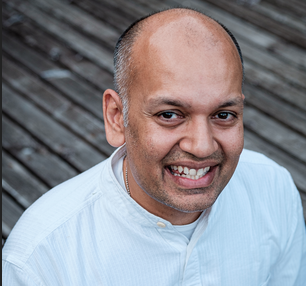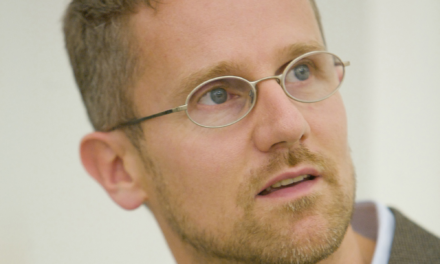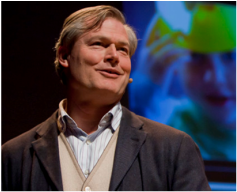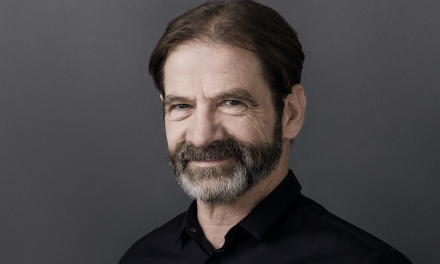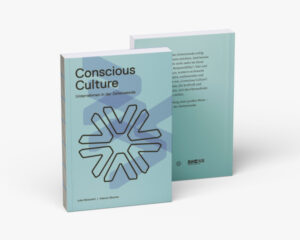Nipun Mehta
is the founder of ServiceSpace,
an incubator of projects that support a gift culture
Reading Time: 9 minutes
‘Flashmob of generosity’ came to my mind when I heard Nipun Mehta talk in our volunteer meeting preparing for a Business and Transformation Pod. It wasn´t the kind of pep talk you would imagine for people coming together to give their time and their professional experience for free. The wording was more like: We’ll come together in several meetings before, during, and after the pod. We will put a lot of collective effort, heart and soul into serving 134 people from all over the world and virtually every time zone, and yet most of it will be invisible. And after that our team will disband and we may or may not come back together again at some point.
Not exactly an offer that makes you shout, ‘Hurray, I´m in!’
And then I looked at the faces in the zoom meeting, and each one of us was grinning hearty grins of joy and anticipation, beaming with the expectation of what was there to come. We couldn´t wait to start.
What was the secret? Why would all these people who had very busy lives and some surprisingly impressive responsibilities in their jobs cut out a big bunch of time of their lives, their jobs, their families and, even their sleep to do that?
And what does the concept of ‘multiple forms of capital’ connect with this?
There is a lot to learn from Nipun Mehta and ServiceSpace on various levels.
- On the level of building a network that is rooted in deep relationships.
- On the level of organizing groups by empowering people.
- On the level of using multiple forms of capital apart from money to create innovative and deeply sustainable outcomes.
- On the level of holding space to enable a circular flow of energy for volunteers, which avoids burnouts and,
- the actual outcome of the many different projects that ServiceSpace facilitates.
‘Be the change you want to see in the world’ is rooted at the very core of this network of volunteers. A network that, over the last 20 years, has become an international multichannel nonprofit organization. Dailygood, Kindspring, Karmatube, Karunavirus, Awakin Talks, Awakin Circles, Karma Kitchen, and the latest baby, the Laddership Pods, are just a few online and offline initiatives that grew out of the initial idea of creating websites for nonprofits for free. Today the ServiceSpace ecosystem has more than 600 thousand members and reaches millions of people every month.
How was it possible to build the world’s largest generosity network that produced outcomes worth millions of dollars without ever looking for funding or asking for anything? Did you never think of fundraising? Or was it a strategic decision?
Nipun Mehta: I wouldn’t say it was strategic. It was rather principled. There’s a beautiful quote by a Chinese meditation teacher: “If you’re off by an inch, in the beginning, you’ll be off by ten thousand miles at the end.” We didn’t know it at the time, but I think what we were really tuned into was the inches.
Over 20 years ago, we started giving sandwiches to the homeless and then building a website for a homeless shelter. We felt great, inspired, and so connected even to each other. We didn’t want to wait till we’re retired to start this ‘giving thing.’ We wanted to start now. With that energy, we immediately thought about how to give this joy to other people. The world is telling you that you need a plan to create a scalable solution. You need to fundraise, get a lot of staff, have a big impact, and trumpet what you’re doing.
It was not that these voices weren’t there, but to us, it seemed off in the inches.
We didn’t want to trumpet what we’re doing or pitch things, and we didn’t want to make projections that we had no control over in the future. We took the risk that maybe it wasn’t going anywhere, but the feeling it created was more precious than all the impact planing and scaling could promise. So, we never got tempted by that.
But scale, you did. By this decision, you created an incredible innovative ecosystem that grew extraordinarily.
During the pandemic, you developed the Laddership Pod concept. An interactive online learning experience for leaders/ladders that stimulates the intellect and builds deep connections. How did you come up with such a solution?
Nipun Mehta: ServiceSpace is a platform that is powered by time-capital — a volunteer ecosystem. With this unique foundation, we were always asking very different questions. During the pandemic, this was very obvious. While most institutions were understandably focused on balancing their ledger, time is a much more fluid resource. By mid-March, we had already launched a content portal KarunaVirus.org, featuring stories of people responding with compassion. Then, while everyone was focused on broadcasting on Zoom, we were asking the question about building deeper connections within a virtual context. Our ecosystem reacted very differently. A community connected by purely intrinsic motivations innovates in a very different way, at a very different pace, and with very different objectives.
The basis for the Pods was our experience with thousands of circles, offline and online. Virtually, we have been hosting numerous online communities and more recently, a six-week peer-learning “Laddership Circle”; and offline, we had thousands of circles and more than hundred retreats with leaders and change-markers across dozens of countries. It gave us incredible insight on how to organize in a way where the “whole is greater than the sum of its parts”. How does this intelligence meet the virtual constraints of the pandemic in a non-commercial context? That’s a very intriguing question, because when no one is cashing out, connections go very deep very fast; and that naturally opens up to gratitude. And since gratitude is regenerative, it brings forth even more capacity and the entire peer learning circle benefits through this virtuous cycle.
Few months into the pandemic, when everyone was hitting a wall with Zoom fatigue, we launched the Pod platform. It was part technology, part social intelligence, and part compassion. A very unique combination. It was designed to incorporate volunteer energy, to help everyone in a Pod to belong, and to amplify the emergence. So we started hosting pods. First one was a Laddershid Pod, with 200 people from 20+ countries. Everyday, you had head readings, hands practice, and heart reflections. It wasn’t just that people were sharing hundreds and hundreds of pages in a short duration, but they were sharing deeply and vulnerably. They interacted with each other’s content. 10-20 volunteers would invisibly hold space for the circle and in a myriad different ways, mirror the whole to itself. It led to some profound connections, not just with others but with ourselves.
In such a field of trust, transformation can arise. And that transformation again leads to gratitude, which is regenerative and propels the whole cycle forward.
Shortly after offering a Laddership Pod, you opened the format for other topics.
Nipun Mehta: Invariably, dozens of people from every pod would want to volunteer for a future pod. And so the beat kept going. After the first Laddership Pod, we’ve held pods from Business to Qigong to Educators to dozens of other themes. People were hungry for it, we had a community of leaders who wanted to share in this way, and we had the platform.
To give you an example of how this can work — I was invited to speak to a group of elders from the Jewish faith. At some level, I give so many talks every year and this is just another talk; but now, at the end, I said, if any of you want to engage further, let’s do a 21-day “New Story” challenge. Lots of people signed up, and we created this challenge using the Pod platform. People didn’t just share personal stories, but by reading the stories of others, it became a collective experience. Gratitude was flowing around in abundance. On the closing call, I remember one woman sharing how she was the last remaining person on both sides of her family, and she never thought she had a story to share until she started writing. But it wasn’t just the linear act of writing sequentially. Doing it day-by-day while reading other responses is what breathed incredible life into her. She shared this with tears in her eyes. So many then wanted to invite others and it multiplied into another Pod, and more volunteers and more ripples. It’s still continuing to this day.
Looking back, I could have just done a typical broadcast of content during my talk. But now I had the option to piggybacking that with a “deepcast” of context. That opens up a whole new field of possibilities. At one level, I could say that thousands of people have joined these pods — but actually, that’s the wrong framing. It’s a broadcasting metric. When one and one come together in a deepcasting context, it becomes more than two. Just imagine if we all unlocked such deepcasting potential alongside all our broadcasting opportunities?
The Volunteers at ServiceSpace are amazing. Volunteering myself on several occasions, I met the most interesting people from everyday heroes to CEOs of companies, famous artists, thought leaders, bestselling authors, and philosophers. What’s the secret to attracting outstanding people to volunteer?
Nipun Mehta: It’s a very simple and very obvious answer. But we just don’t have faith in that simplicity. The principle is that everybody wants to practice love. And by love, I don’t mean some lofty idea.
Everybody wants to give unconditionally.
In most organizations, when you open up a volunteer opportunity, it’s a means to an end. You donate your time and skills for a particular outcome. So your contributions are a means to that end. In ServiceSpace, that’s not the case. Of course, it’s going to have an outcome and an impact — but that’s the side-effect. Means is the end in itself. The fact that you are volunteering and moving from me-to-we, that by itself, is a major contribution to society. When that volunteer process is carefully tended to, you are tending to people’s hearts. And when you tend to people’s hearts, everyone wants to come because everyone wants that connection with themselves.
Yes, it’s true; we have remarkable people who come to volunteer at ServiceSpace. Some of the most famous people on the planet, some of the most powerful and some of the richest people. They’ll all volunteer, but so will everybody else. So it’s not just those that make a good headline. From a ServiceSpace lens, the money, power or fame of a volunteer doesn’t make much of a difference, since we’re not organized around those resources. So many times, I’ve known people for years, and only later have I realized that they were a major influencer in the traditional world. The way our ecology is designed, an everyday hero is just as potent as a billionaire or a celebrity. And you know, the really wild thing? Even the most remarkable people miss being seen as an everyday person. We think that patting our ego is strengthening, but actually, it’s crippling.
Everyone wants to love and be loved. That is, they want to be loved for who they are, not what they have accumulated.
It’s so powerful and so simple. We all know it. This happens when we sometimes meet a stranger and are moved to tears, or we merely watch somebody doing an act of kindness for a third person and still get the goosebumps. We intrinsically recognize this connectedness. And yet, it’s shocking how few spaces allow us to cultivate that. ServiceSpace is an unapologetic ecosystem for precisely that — small acts of service to change yourself, deepen your connections to life and trust in the ripple effect. Just trying to change the world without tending to our inner being only leads to burn-out. But when we lead with inner transformation, it effortlessly ripples out into external impact. That’s why our tagline is: Change Yourself, Change the World. Not the other way around.
It’s what we learned in one of our first experiences when we gave out lunches to homeless people: We thought we were helping but realized in the process that we were being helped as well. We renamed our project from “Help the Homeless” to “Hear the Homeless.” Instead of giving out sandwiches, we were sharing a meal with them. If we really pay attention, it’s the same experience that all volunteers have repeatedly: the boundaries between giver and receiver are blurred. I might be giving food capital, but I might be receiving in alternate forms of wealth, like connection or trust or story or gratitude.
It is simply impossible to give without receiving. When a group of people walk into a room with that orientation, an entirely new world of possibilities opens up. That’s what we’ve seen over the last twenty years.
About:
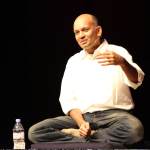 Nipun Mehta is the founder of ServiceSpace, an incubator of projects that works at the intersection of volunteerism, technology and gift-economy. What started as an experiment with four friends in Silicon Valley has now grown to a global ecosystem of over 600,000 members that has delivered millions of dollars in service for free. Nipun has received many awards, including the Jefferson Award for Public Service, Wavy Gravy’s Humanitarian award, and Dalai Lama’s Unsung Hero of Compassion. In 2015, President Barack Obama appointed him to a council on poverty and inequality. Nipun is routinely invited to share his message of “giftivism” to wide ranging audiences, from inner city youth in Memphis to academics in London to international dignitaries at the United Nations; his speech at UPenn commencement in May 2012 was read by millions. He serves on the advisory boards of the Seva Foundation, the Dalai Lama Foundation, and Greater Good Science Center.
Nipun Mehta is the founder of ServiceSpace, an incubator of projects that works at the intersection of volunteerism, technology and gift-economy. What started as an experiment with four friends in Silicon Valley has now grown to a global ecosystem of over 600,000 members that has delivered millions of dollars in service for free. Nipun has received many awards, including the Jefferson Award for Public Service, Wavy Gravy’s Humanitarian award, and Dalai Lama’s Unsung Hero of Compassion. In 2015, President Barack Obama appointed him to a council on poverty and inequality. Nipun is routinely invited to share his message of “giftivism” to wide ranging audiences, from inner city youth in Memphis to academics in London to international dignitaries at the United Nations; his speech at UPenn commencement in May 2012 was read by millions. He serves on the advisory boards of the Seva Foundation, the Dalai Lama Foundation, and Greater Good Science Center.
photocredit manuel gruber, manuelgruber.me

